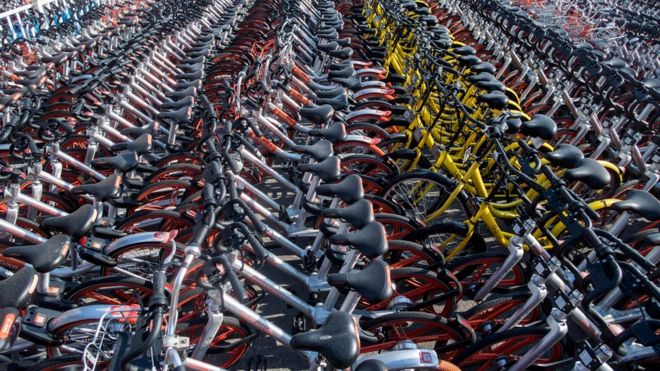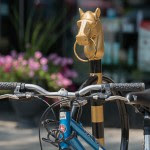I've been reading about bamboo bicycles for the past few years. I have only seen two in person, neither with a rider aboard. So, apart from what I've read in a few cycling magazine and blog reviews, I know nothing about their ride qualities. And those reports vary widely.
It seems that there are basically two types of bamboo bikes: the ones that have some sort of metal at their joints and the ones--like Calfee's--that are made by joining bamboo tubes with hemp.
I must say that if I were rich, I'd buy a bamboo bike as an objet d'art or a conversation piece, but certainly not as my only bike. From what I've read and heard, such a machine--an odd term, isn't it, to use in reference to something made of bamboo--would give a cushy but not very snappy ride. That, of course, would rule it out for a "do it all" bike, let alone one for fast rides.
A bamboo bike might not "ride on rails". But neither would the latest creation from Portland (where else?)-based wooden bike specialist Renovo. A wobbly ride on it, however, might not be the fault of the bike itself--or its materials. Rather, the problem, if you will, is more likely to lie with the rider.
You see, the latest Renovo model is made from barrels in which Scotch--specifically, Glenmorangie--was aged. The renowned distiller, who is marketing the bike, ships the wood to Renovo in Portland, where the frames are crafted and finished--with the distiller's name on the right chainstay.
And, of course, the wood is infused with the world-famous libation. Dr. Bill Lumsden, director of Glenmorgie's distilling and whisky creation, says that the casks are used only twice to make The Original, "a whisky which balances hints of ripening peaches and citrus fruits with creamy vanilla notes, to delight malt connoisseurs and amateurs alike."
Now, I don't know whether you'd notice those hints of peach and citrus or notes of vanilla while you're riding. I'm not even sure they have anything to do with the color and texture of the wood, let alone the bike's durability or ride quality. Does the whisky dampen shock?
Whatever the case, Dr. Lumsden says that even though his creation is mixed with the wood, customers shouldn't combine it with riding the bikes made from the barrels in which it's aged. The original should be consumed apres-velo.
It seems that there are basically two types of bamboo bikes: the ones that have some sort of metal at their joints and the ones--like Calfee's--that are made by joining bamboo tubes with hemp.
I must say that if I were rich, I'd buy a bamboo bike as an objet d'art or a conversation piece, but certainly not as my only bike. From what I've read and heard, such a machine--an odd term, isn't it, to use in reference to something made of bamboo--would give a cushy but not very snappy ride. That, of course, would rule it out for a "do it all" bike, let alone one for fast rides.
A bamboo bike might not "ride on rails". But neither would the latest creation from Portland (where else?)-based wooden bike specialist Renovo. A wobbly ride on it, however, might not be the fault of the bike itself--or its materials. Rather, the problem, if you will, is more likely to lie with the rider.
You see, the latest Renovo model is made from barrels in which Scotch--specifically, Glenmorangie--was aged. The renowned distiller, who is marketing the bike, ships the wood to Renovo in Portland, where the frames are crafted and finished--with the distiller's name on the right chainstay.
And, of course, the wood is infused with the world-famous libation. Dr. Bill Lumsden, director of Glenmorgie's distilling and whisky creation, says that the casks are used only twice to make The Original, "a whisky which balances hints of ripening peaches and citrus fruits with creamy vanilla notes, to delight malt connoisseurs and amateurs alike."
Now, I don't know whether you'd notice those hints of peach and citrus or notes of vanilla while you're riding. I'm not even sure they have anything to do with the color and texture of the wood, let alone the bike's durability or ride quality. Does the whisky dampen shock?
Whatever the case, Dr. Lumsden says that even though his creation is mixed with the wood, customers shouldn't combine it with riding the bikes made from the barrels in which it's aged. The original should be consumed apres-velo.














![Larry Batten, Chain Reaction Ministries coordinator, refurbishes bicycles at First Christian Church of Oklahoma City to give away to those who need them. [Photo by Jim Beckel, The Oklahoman]](https://cdn2.newsok.biz/cache/w640-1fe82ca5d5855fe575898c063dbaa974.jpg)












